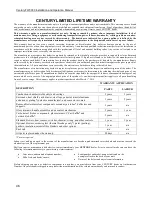
Century FW3000 Installation and Operation Manual
45
28
44073
CROSSFLOW BLOWER 115V-60Hz-39W 100 CFM (P)
1
29
44085
RHEOSTAT KNOB
1
30
44087
RHEOSTAT NUT
1
31
44080
RHEOSTAT WITH NUT
1
32
AC02055
QUICK CONNECT THERMODISC
1
33
44046
THERMODISC F110-20F
1
34
SE45632-
01
FW3000 INSTRUCTION MANUAL KIT
1
35
29015
4'' x 9'' x 1 1/4'' REFRACTORY BRICK
9
36
29010
4 1/2" X 9" X 1 1/4" REFRACTORY BRICK
10
37
PL36049
4 1/2" X 4 1/2'' X 1 1/4'' REFRACTORY BRICK
1
38
PL36024
1 7/8" X 4 1/2" X 1 1/4" REFRACTORY BRICK
1
39
SE16059
ASH DUMP PLUG
1
40
PL55095
SECONDARY AIR TUBE
4
41
21216
VERMICULATE BAFFLE 14 3/4'' X 20 1/8'' X 1''
1


































